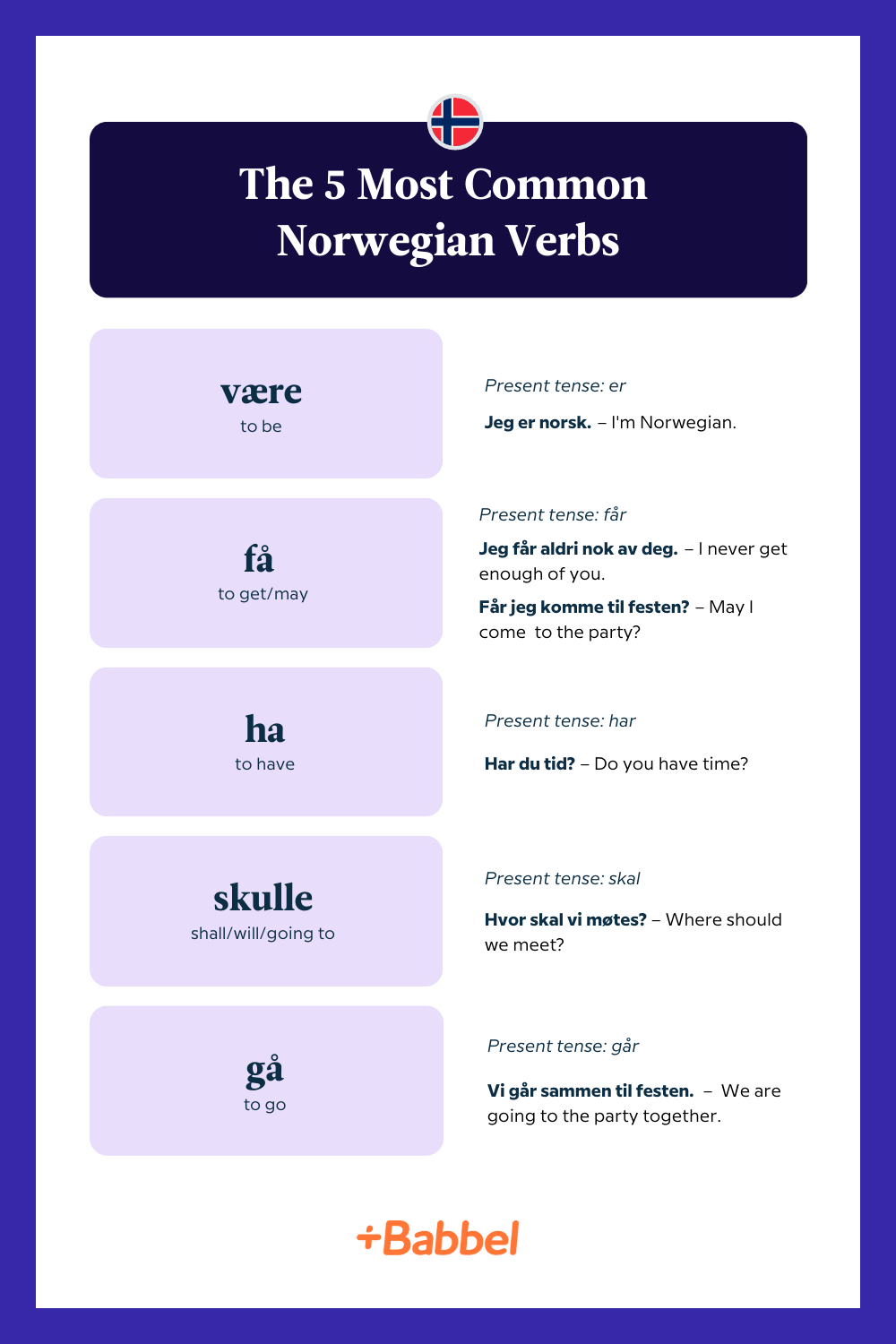Here’s some good news about Norwegian: its verbs are actually really easy to master. (Really? Yes, really!) Norwegian verbs are not conjugated according to who or what is doing the action. Unlike in English or other European languages you may have experience with, they stay the same regardless of the subject. On top of that, Norwegian has just one form for the present tense. Lucky you!
It probably goes without saying that verbs are essential for communication, and learning the most common Norwegian verbs will get you far for your first conversations. So without further ado, here are the 20 most common Norwegian verbs and how to use them.

The Top 20 Norwegian Verbs
1. være – to be
Present tense: er
Example: Jeg er norsk. (I’m Norwegian.)
2. få – to get / may
Present tense: får
The two separate meanings of this verb make it a very common word!
Example: Jeg får aldri nok av deg. (I never get enough of you.) or Får jeg komme til festen? (May I come to the party?)
3. ha – to have
Present tense: ha
Example: Har du tid? (Do you have time?)
4. skulle – shall / will / going to
Present tense: skal
Skal is a modal verb and is usually used with another verb in everyday speech and writing.
Example: Hvor skal vi møtes? (Where should we meet?)
Conveniently, it’s also used to talk about the future, for example, “Jeg skal reise til Norge i sommer” (I’m going to travel to Norway in summer).
5. gå – to go
Present tense: går
Example: Vi går sammen til festen. (We are going to the party together.)
6. kunne – can
Present tense: kan
Like skulle, kunne is another Norwegian modal verb. This one in particular is helpful for asking questions and getting conversational quickly!
Example: Kan du hjelpe meg? (Can you help me?)
7. ville – want
Present tense: vil
Example: Hva vil du drikke? (What do you want to drink?)
8. komme – to come
Present tense: kommer
Example: Han kommer i morgen. (He’s coming tomorrow.)
9. bli – to become
Present tense: blir
This is another modal verb that can be used to talk about the future.
Example: Hun blir bestemor snart. (She will become a grandma soon.)
Bli is often used in the sentence “Blir du med?” (Would you like to come?). When used with adjectives like syk, sint or overrasket, it is better translated as “get.”
Example: Han blir sint. (He is getting angry.)
10. ta – to take
Present tense: tar
Example: Hun tar toget til Oslo. (She is taking the train to Oslo.)
11. gjøre – to make, do
Present tense: gjør
Example: Hva gjør du? (What are you doing?) or Jeg gjør ingen planer i dag. (I’m not making any plans today.)
12. spørre – to ask
Present tense: spør
Example: Bare spør. (Just ask.)
13. tro – to believe
Present tense: tror
Example: Tror du på troll? (Do you believe in trolls?)
14. vite – to know
Present tense: vet
Example: Jeg vet ikke. (I don’t know.)
15. si – to say, tell
Present tense: sier
Example: Hvordan sier man det på norsk? (How do you say that in Norwegian?)
“Si det” (tell me) is a phrase you’ll hear a lot, and is often used when someone doesn’t have an answer, like in the following exchange:
- Person A: Hva skal vi spise? (What should we eat?)
- Person B: Godt spørsmål, si det. (Good question, tell me.)
16. gi – to give
Present tense: gir
Example: Han gir henne et kyss. (He’s giving her a kiss.)
17. trenge – to need
Present tense: trenger
Example: Jeg trenger ti minutt til. (I need ten more minutes.)
18. se – to see, look
Present tense: ser
Example: Ser du stasjonen? (Do you see the station?) or Hva ser du på? (What are you looking at?)
19. like – to like
Present tense: liker
Example: Jeg liker fisk. (I like fish.)
20. finnes – to be, exist
Present tense: finnes/fins (both are used and are interchangeable)
Example: Finnes det en minibank i nærheten? (Is there an ATM nearby?)
Once you know these Norwegian verbs, you could start a conversation like: “Hei. Jeg er Karoline. Blir du med til festen?” (Hello. I’m Karoline. Would you like to come to the party?) So what are you waiting for?











